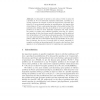Free Online Productivity Tools
i2Speak
i2Symbol
i2OCR
iTex2Img
iWeb2Print
iWeb2Shot
i2Type
iPdf2Split
iPdf2Merge
i2Bopomofo
i2Arabic
i2Style
i2Image
i2PDF
iLatex2Rtf
Sci2ools
STACS
1997
Springer
1997
Springer
Strict Sequential P-completeness
In this paper we present a new notion of what it means for a problem in P to be inherently sequential. Informally, a problem L is strictly sequential P-complete if when the best known sequential algorithm for L has polynomial speedup by parallelization, this implies that all problems in P have a polynomial speedup in the parallel setting. The motivation for defining this class of problems is to try and capture the problems in P that are truly inherently sequential. Our work extends the results of Condon who exhibited problems such that if a polynomial speedup of their best known parallel algorithms could be achieved, then all problems in P would have polynomial speedup. We demonstrate one such natural problem, namely the Multiplex-select Circuit Problem (MCP). MCP has one of the highest degrees of sequentiality of any problem yet defined. On the way to proving MCP is strictly sequential Pcomplete, we define an interesting model, the register stack machine, that appears to be of inde...
Related Content
| Added | 08 Aug 2010 |
| Updated | 08 Aug 2010 |
| Type | Conference |
| Year | 1997 |
| Where | STACS |
| Authors | Klaus Reinhardt |
Comments (0)

